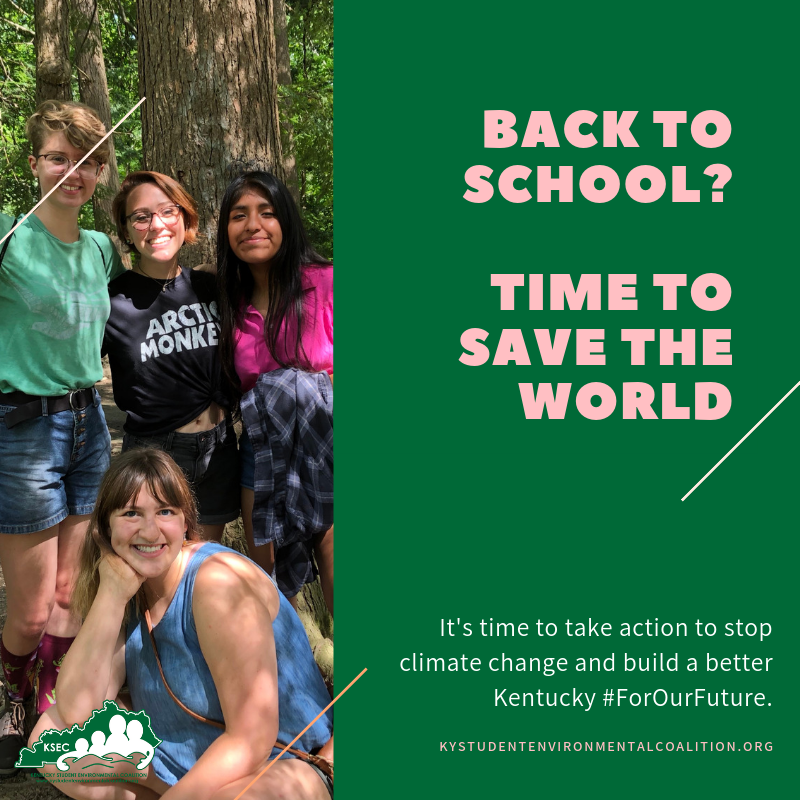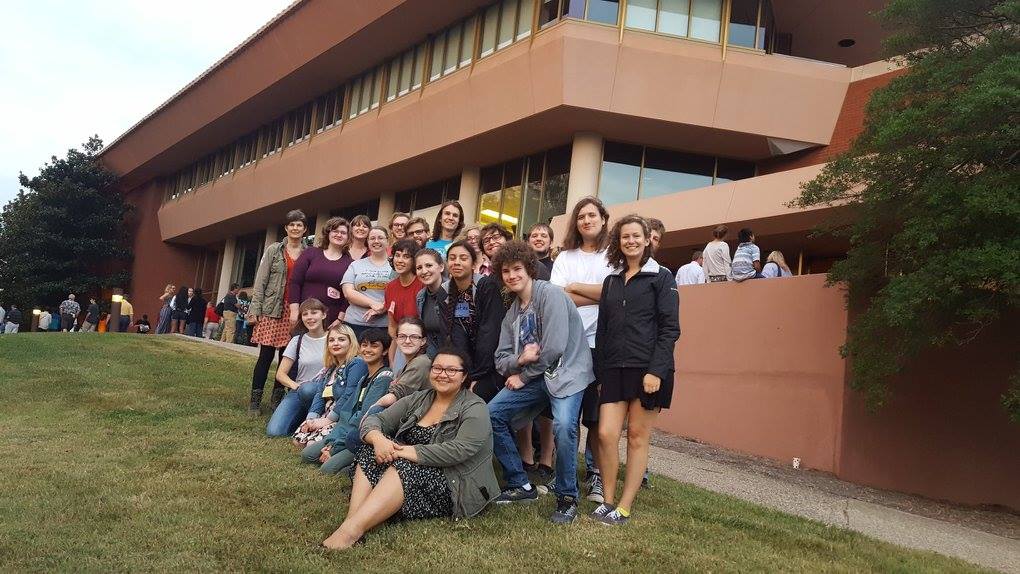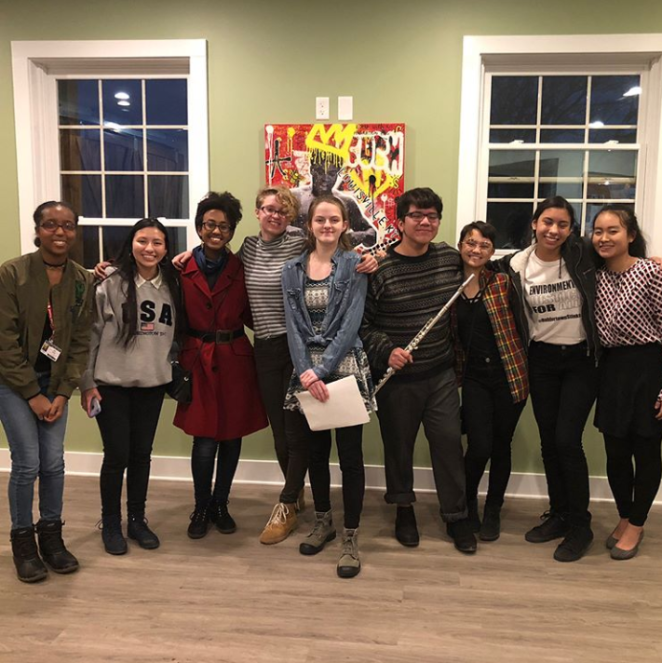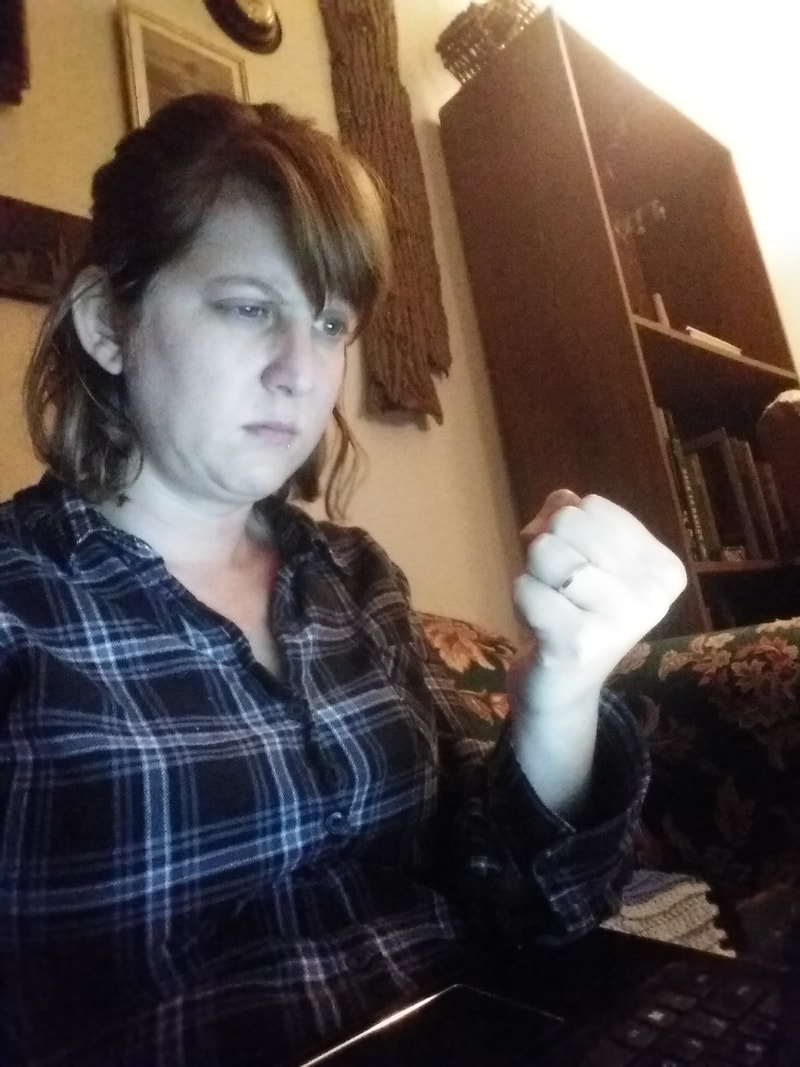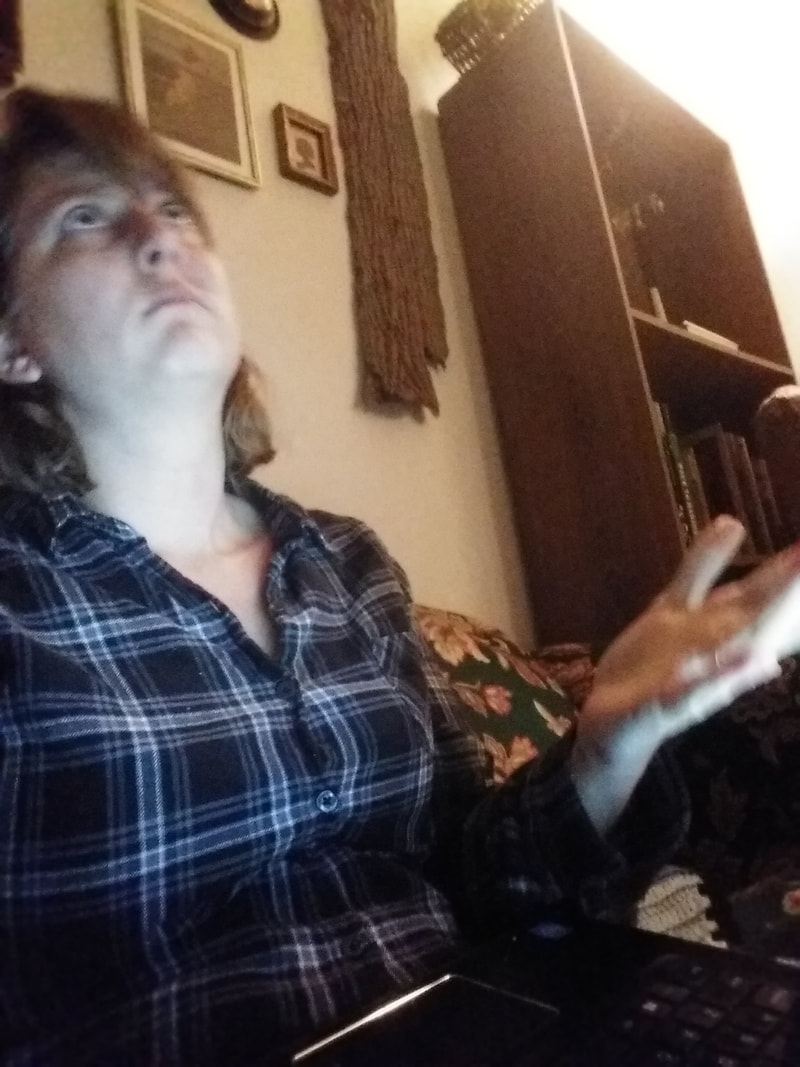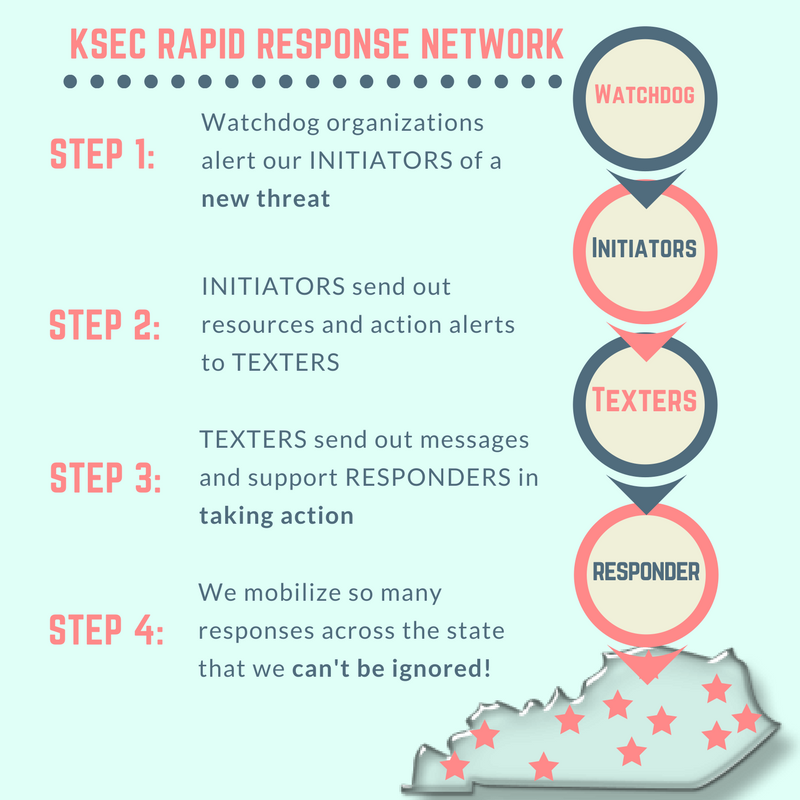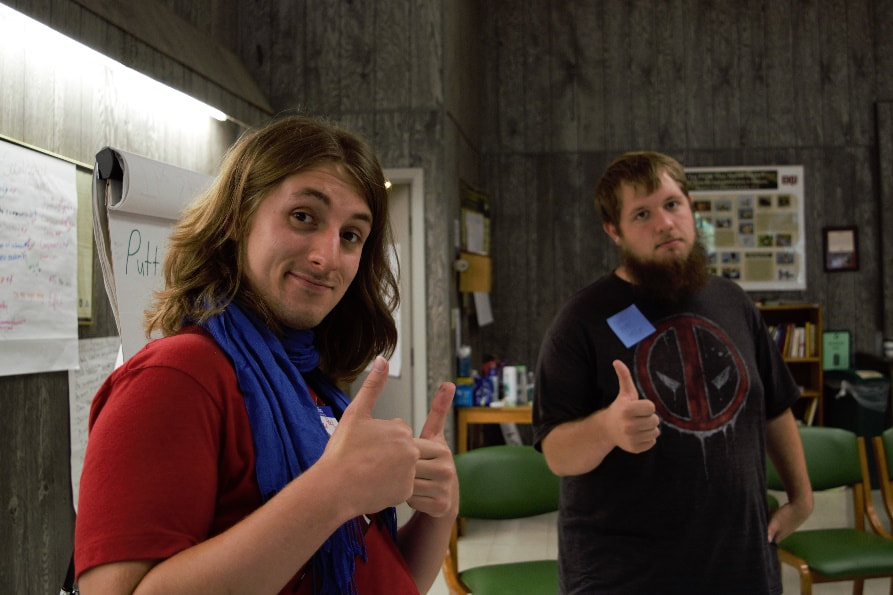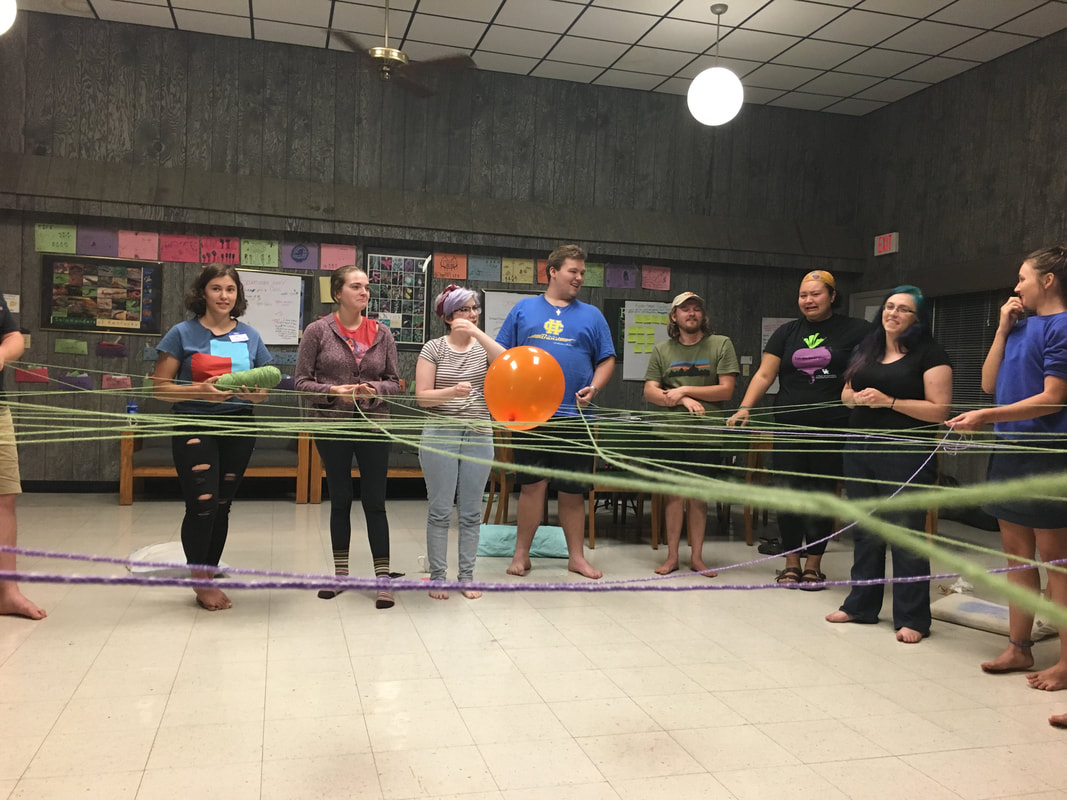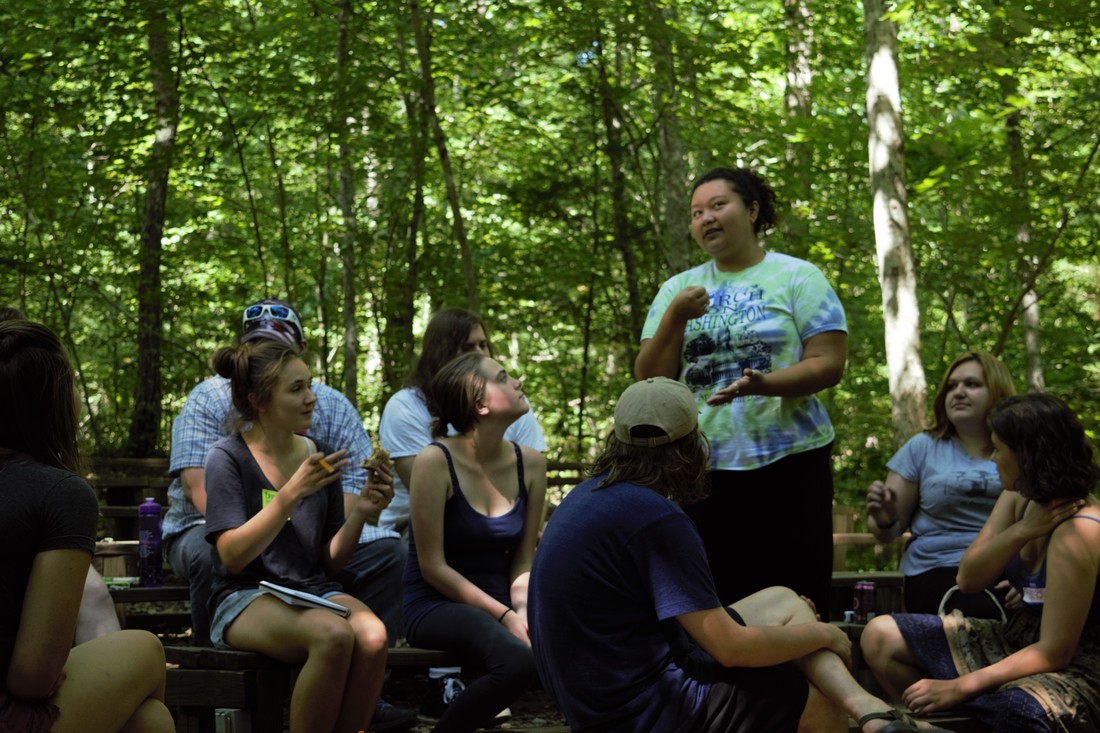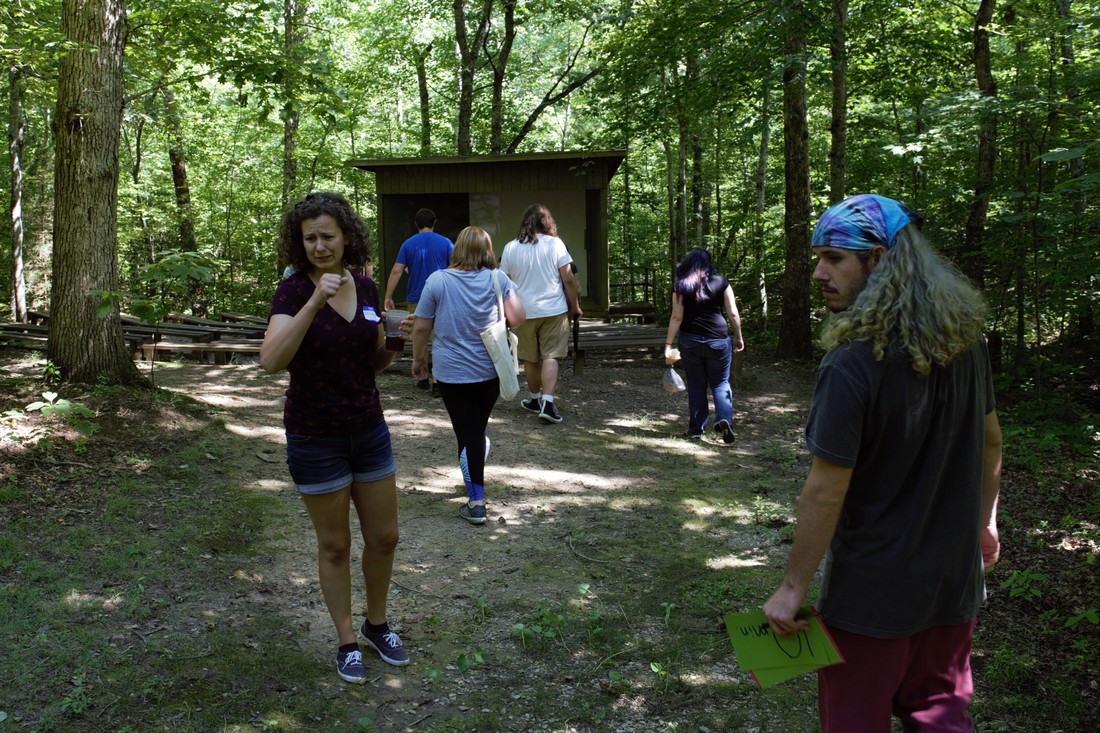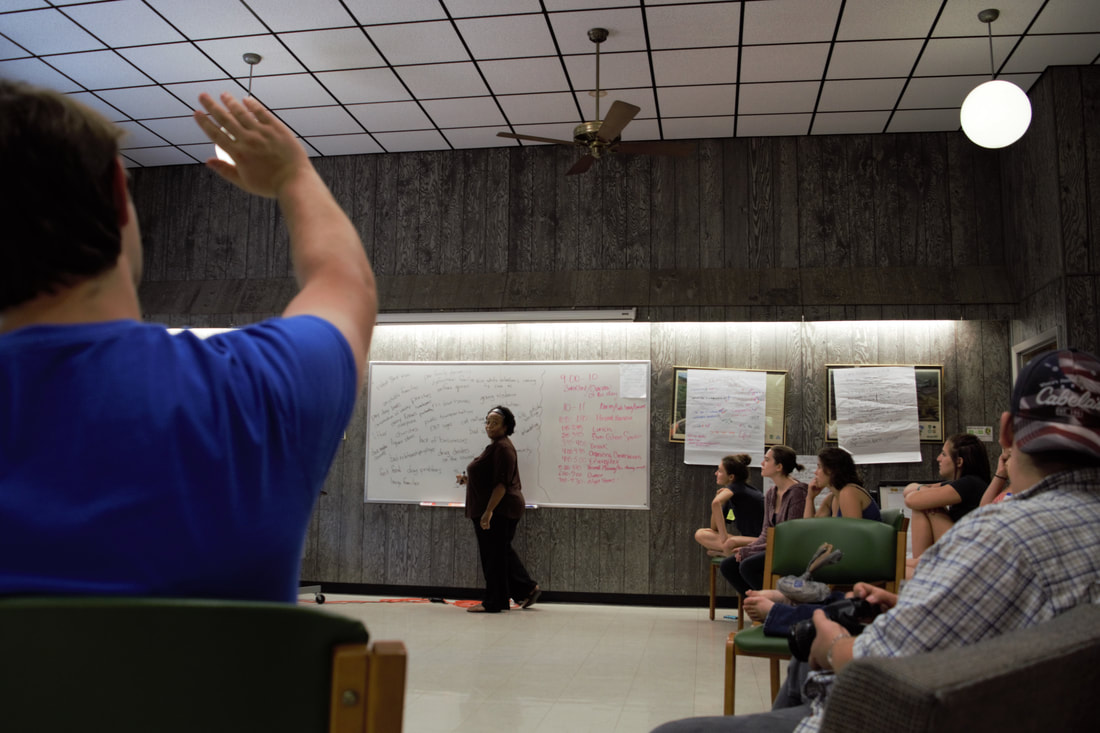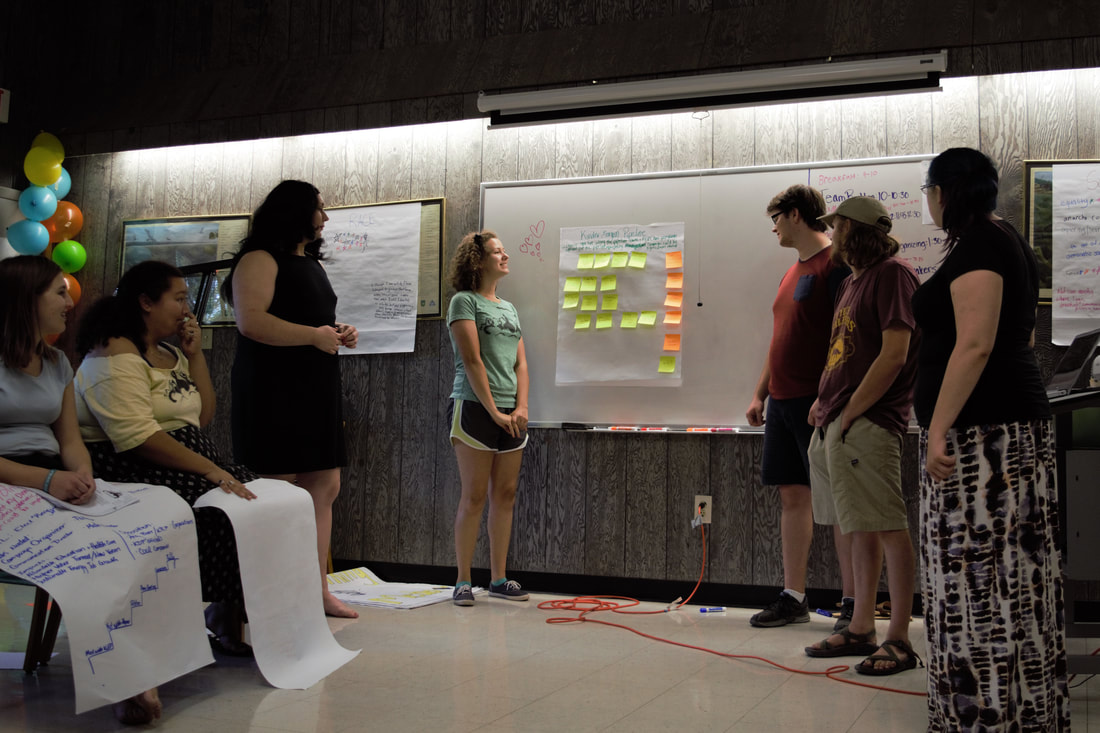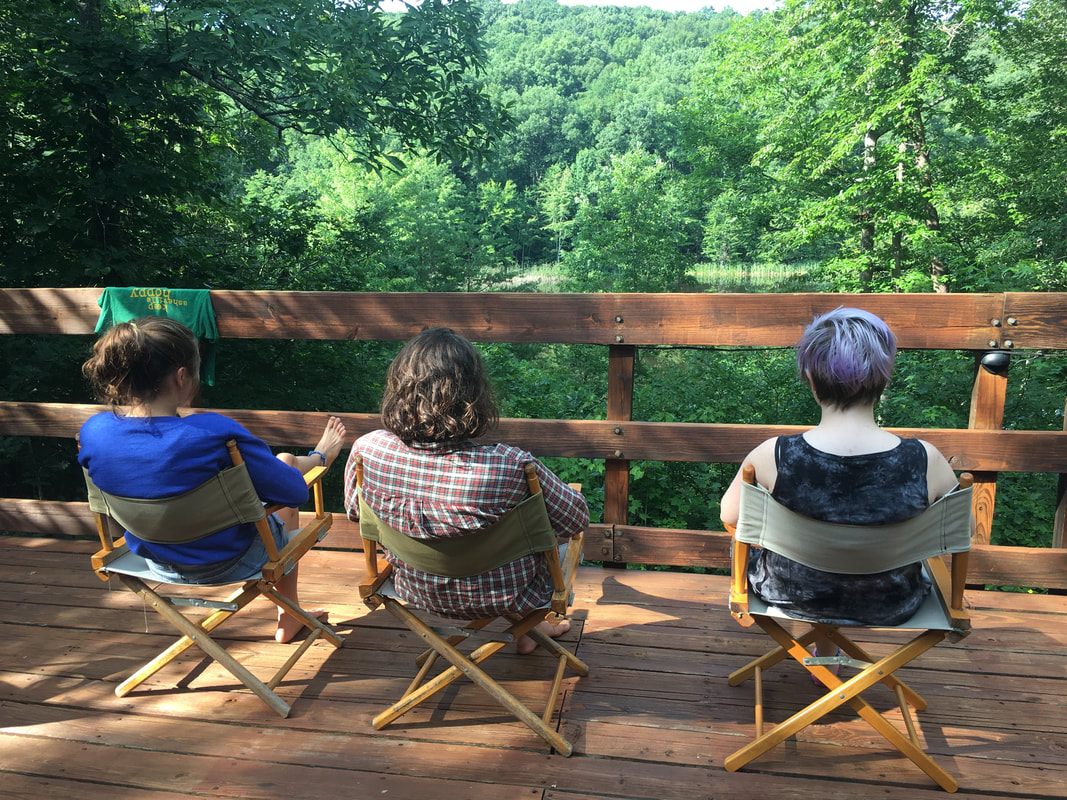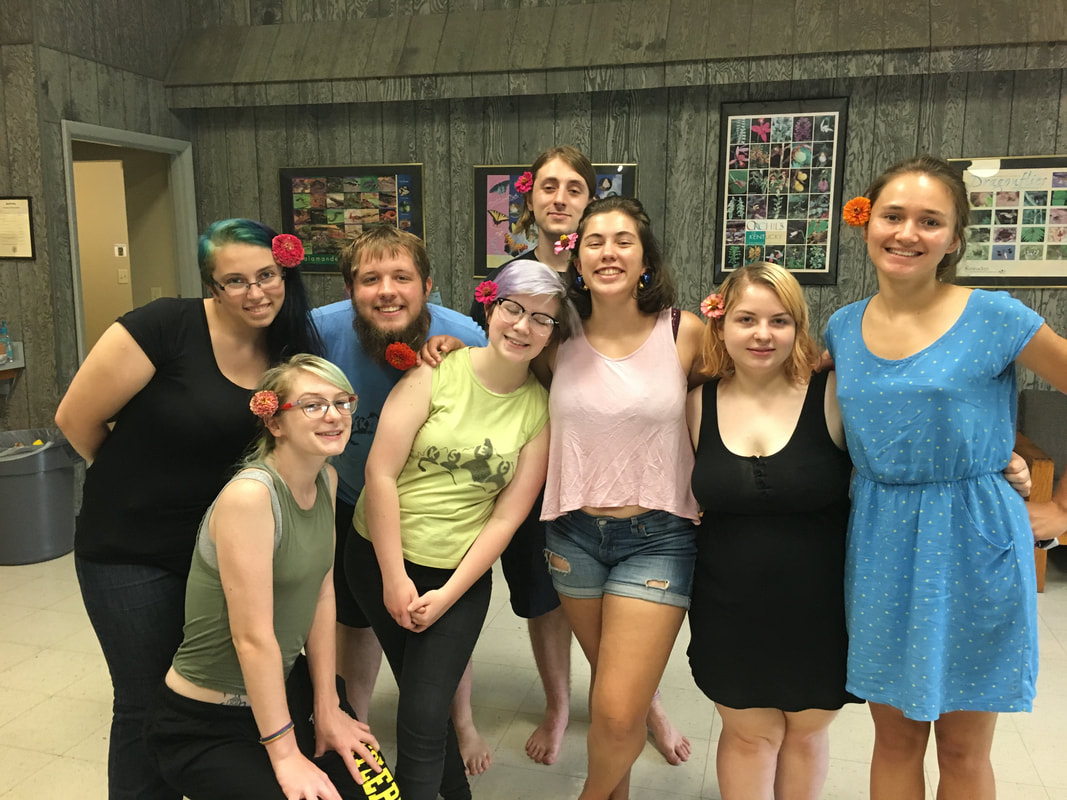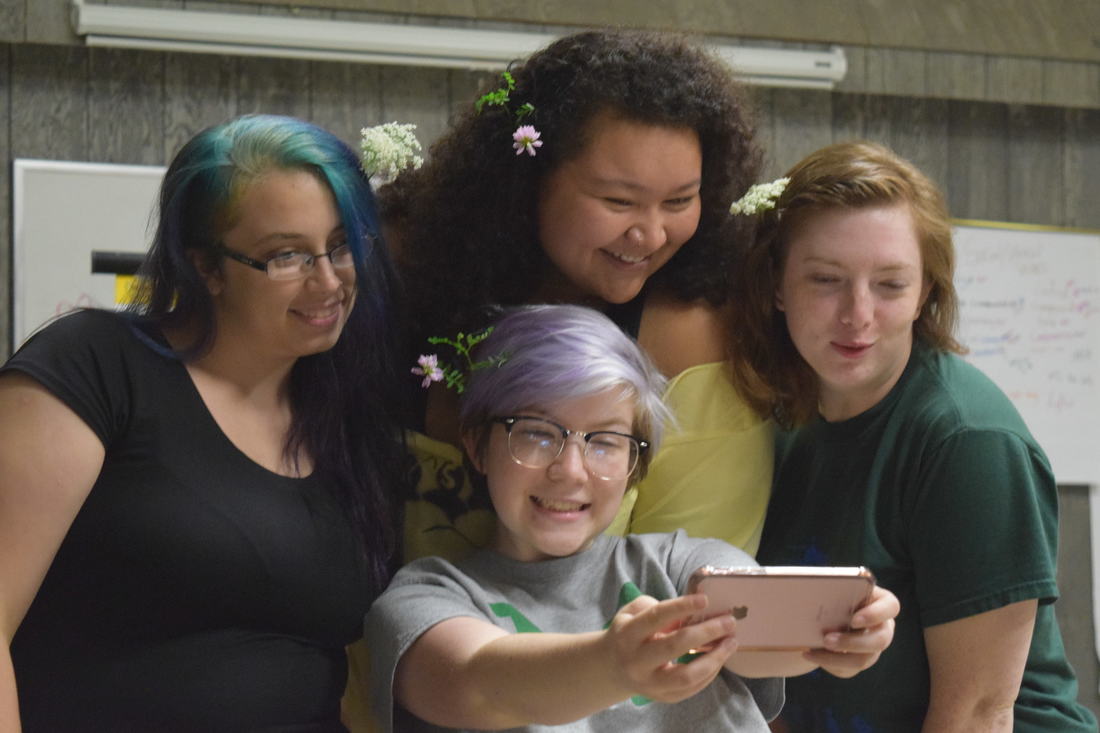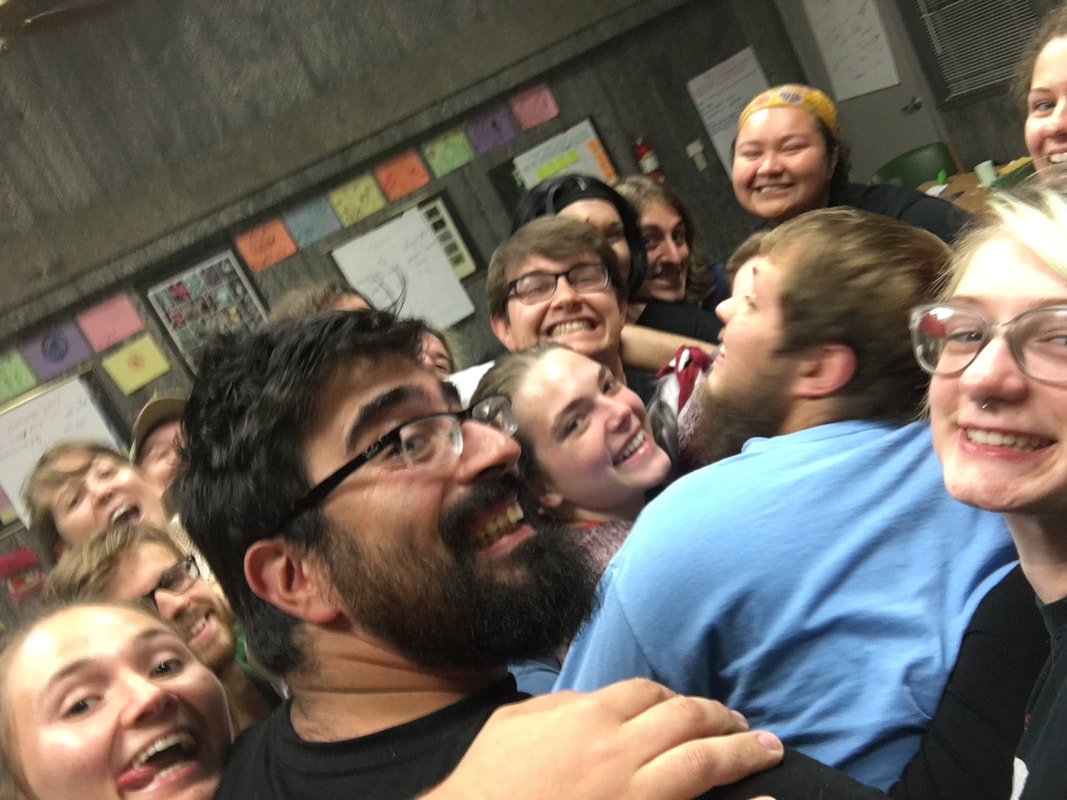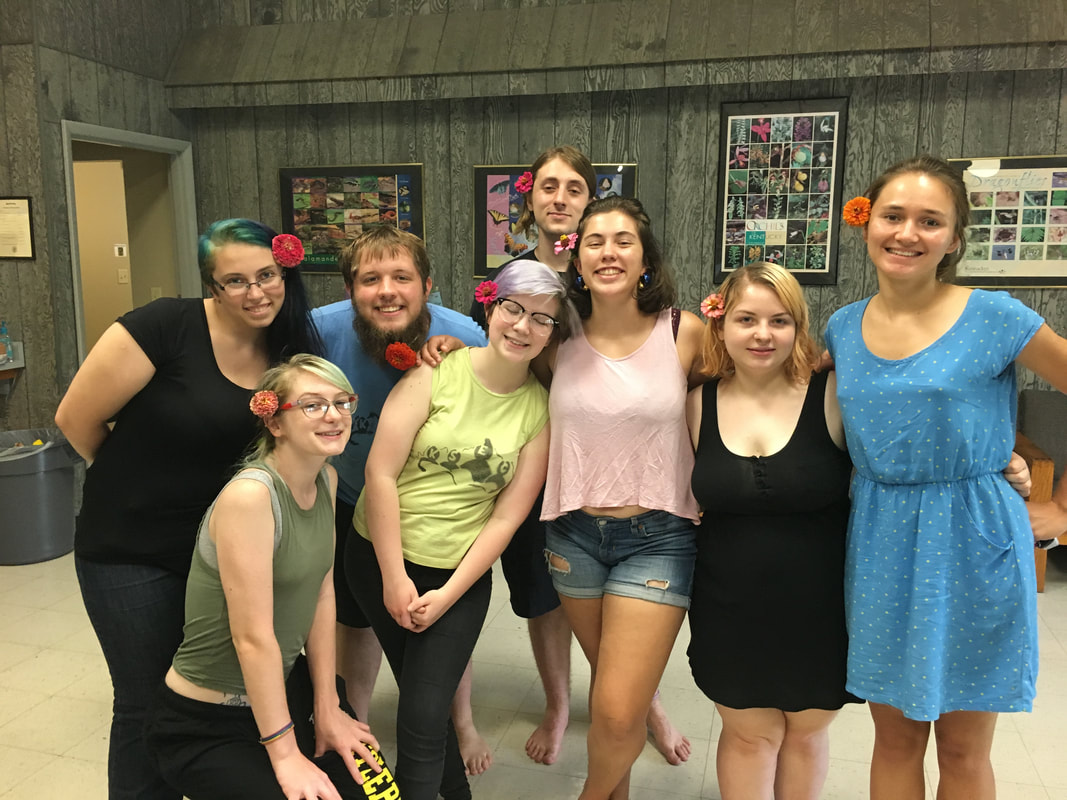A new semester has begun for students across Kentucky, and that means one thing: it’s time to join the movement. KSEC is building a strong, united youth movement to fight for a just and environmentally sustainable future in our communities and beyond.
All this work contributes to the movement. Success in the movement, however, requires contributions from many people like you. Our movement has a role for everyone, so what’s your role? Your role may be to join an environmental group on your campus; it may be to start one! KSEC can help you do that. We have a toolkit of resources with all the information you need to get a group off the ground, and our campus organizers are happy to guide you along the way. Joining a campus group offers a variety of roles you can adopt depending on your ability and capacity.
Your role may be to improve the effectiveness of your campus group. Once again, KSEC can help. Our campus organizers can train your members in everything from how to run a meeting, how to recruit new members, how to effectively run social media, and beyond.
If any of these campaigns speak to the needs on your campus, KSEC can help get you begin to address those needs.
All of the roles discussed above are vital to the health and success of the movement for a just and sustainable future. Whatever role in the movement you choose, we have a way to help you succeed. All you have to do is join up and try on a role.
0 Comments
By Sadie Lawrence Where We Are From
By Sadie Lawrence We are from the dirt A small seed That has grown From the earth To a magnificent, towering oak We are from the ashes A fiery phoenix That has risen From the remains To emerge burning and powerful We are from the clouds A thundering storm That has formed From electrical charge To rain down strength and beauty We are from the ground A pounding river That has washed away doubts From the bank of our past To flow clean and clear on the path to the future *** It is my belief that we are all made from the same stuff. We are formed from the stardust leftover from when the universe erupted into existence. And we are all humans. We all want the best for ourselves and our children, our future. Since I joined KSEC last semester, I have felt increasingly empowered to make my small part of the universe heard. I organized an art gallery last semester revolving around the theme “Problems and Solutions in the Community.” I also helped plan a Determination Rally with the Young Earth Activists Club at my high school advocating against the pulling out of the Paris Climate Agreement. And now I am working with KSEC’s Political Working Group to plan the Rise Up Kentucky Rally on February 12th in Frankfort. This rally is all about making youth’s voices heard. We may be from fewer years, but that doesn’t mean we don’t care about the looming future. In fact, I’ve heard from many of my peers and from personal experience that the future gives many young people a lot of anxiety. We’re not sure what to do next. We ask which stepping stone will be the most stable and sturdy? What will happen if we choose the wrong one? When I am unsure about the next step to take, it’s easy to shut down and try to take comfort in knowing someone else could always fill my place. There are always other people with more passion and more knowledge. “It won’t matter what I do anyway. I’m just one person in a world of 7 billion.” But the thing is, every single person counts. Every single person’s stardust is needed to make up the universe. Without it, the world we live in would be very different. Right now, this generation and those to come are being threatened by a changing climate, air and water pollution, and an economy that extracts our wealth and our health. For me, KSEC gave me a way to combat that anxiety and gave me actions I can take to address the problems at hand. I have ways to contribute and ways to show people that I am not apathetic about my future. This is one of the goals of the upcoming Rise Up Kentucky Rally: to learn new tactics to resist threats. We are showing that KSEC has enabled youth in the past. That we have empowered young people before, and we are continuing to now. That our fight for the future won’t stop. And that there are ways for our stardust to shine in a darkening world. By Cara Cooper, KSEC Statewide Organizer It feels like I’ve been holding my breath a little bit since the 2016 election results. What will happen next? Where will the next threat hit us? It seems like there is no shortage of things happening to make me feel enraged. To be honest it’s been hard to keep up. The problem is that I can’t just become numb- decision makers need to hear from us. Often they only hear from paid lobbyists on the issues that impact us and even just mobilizing a few calls or letters can make a huge difference. We saw this earlier this year when KSEC and other solar advocates mobilized enough calls to Senator Carpenter that he pulled his bad solar bill off the docket. It can and has been done. And on top of that I know that is on our generation to step up and shape our vision for a just and sustainable Kentucky because we are inheriting the responsibility of protecting our communities and natural resources for our future and the future generations. We can’t let ourselves get overwhelmed or to give in to the feeling of powerlessness. The only way that we are going to win is if we stand together and show that we are powerful and united across the state. My face when I'm scrolling through all the bad news That is why we need a rapid response network. What if we had an easy way to identify the issues that we can have the most impact on, educate our friends about these issues across the state and mobilize dozens (or many, many more) responses as soon as a new threat arises? Now we can. Our new Rapid Response Network (RRN) is a peer-to-peer texting network that will allow us to connect with members across the state who have agreed to take action when we need it most. We’re partnering with watchdog organizations in Kentucky to quickly learn about new issues as they pop up and recruiting a team of texters and responders to get the word out and to take quick, strategic action. With the RRN we can mobilize quickly to show our unity and power like never before.
What does the RRN look like? Basically, watchdog organizations will alert a Rapid Response Network INITIATOR who will craft the action alert, gather resources and notify TEXTERS. Then our TEXTERS will send action alert text messages to our RESPONDERS using a peer-to-peer texting app called Relay and RESPONDERS will jump into action (anything ranging from making a phone call to the governor to submitting a letter to the editor to your local paper, to planning or attending a local vigil or rally). Don’t worry, TEXTERS will be there to support our RESPONDERS with resources and tools to make it easy. Read more about the roles here. When we work together and mobilize simultaneously across the state there is no doubt in my mind that we will blow the minds of our legislators and other decision makers with our coordination and power. We might not be able to stop every new threat to our environment but we sure as hell can make our voices heard. #ForOurFuture
In order for this plan to be successful we need committed people to sign up and for everyone to take action. You can sign up to be an INITIATOR, TEXTER or RESPONDER and someone will follow up with you to answer any questions you have before getting started. The actions we take (or don’t) really matter right now. Help us show that our generation is not apathetic and be a part of a real, tangible way to get your voice heard. Sign up now! By Jae Sledge, Catalyst Trainer Two of our trainers are getting ready to facilitate great conversations around how to use the skills they learned throughout the week. The group does an activity where we share one continuous string together and in the end, it holds up a balloon. This is to represent community, and many communities coming together to accomplish a common goal; Something we felt like we did that week. Participants like Sophia lead conversations and learn from each other. Not only that but they learn about each other, creating understanding friendships. Allison, one of the participants, worries about the safety of the baby toads. While others are on their way to the theater, she works on making sure people don’t step on them. Eboni Cochran came to speak about environmental racism. It affects her community in Louisville, called Rubbertown. This stresses the importance of intersectionality and inclusivity within the environmental movement. Participants put their skills to use in making an actionable plan for a campaign. They blew it out of the water with the limited time they were given! During downtimes, we tried to enjoy the environment and/or the company of those around us. Emma, Grace, and Libby look out over the pond. Flowers are cute and so are we! Friends taking selfies with some more flowers sprinkled in it. A big ol’ cinnamon roll hug at the end of the week with everyone who wanted to join in.
Just what the heart needed. By Tyler Hill, Catalyst Trainer 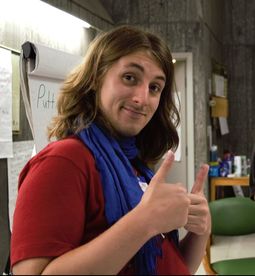 Tyler about to facilitate a training at Catalyst 2017. Tyler about to facilitate a training at Catalyst 2017. I’m the type of person who uses every available minute to think through a decision. I consider the benefits and scrutinize the downsides of every facet of a choice, giving every consideration its due twice over before finally settling on an option. While this process usually leaves me satisfied, often I find myself scurrying at 11:53 PM to fill out an application due at midnight. That’s how I spent the last minutes before 2017 arrived, applying to be a Catalyst trainer. I stressed over the decision to join the Catalyst training team from the moment I finished being a participant at the 2016 camp. That week in July had been one of the best in my life. I’d learned so much useful information which I immediately applied to my student organizations at university. More importantly to me, though, I connected with smart, kind, like-minded people who opened my eyes to new ideas and made me feel comfortable doing so. I’d left Catalyst ready to make a difference. Returning to the program as a trainer, however, seemed daunting in light of my circumstances. Spring semester 2017 was my last as an undergraduate at University of Kentucky, and I had two senior writing courses to complete on top of my day job. I didn’t think I would have enough time in the day to prepare trainings or raise money. In the end, I decided I could juggle those responsibilities. That’s how I came to hit “enter” on that application only a minute from midnight. Now that this year’s Catalyst has come and gone, I would like to help people like me who may be stressing over the decision to join next year’s team. A full accounting of the Catalyst process ought to give you an idea of what to expect. While my experience is mine alone, I think that those of you tempted to apply might find something of value in it. I would say to you potential future trainers that the process of creating Catalyst was fulfilling from the first team call in January to the last hug goodbye in July. Phone calls, as it happens, are a key part of the process. Communication among the directors and trainers is key to turning the Catalyst dream into a reality. My teammates and I spoke over the phone many, many times. There were the weekly team calls in which we talked big strategy -- how to raise funds, who to raise funds from, who to recruit, where to ask for donations of food, and so on. There were one-on-one calls between directors and trainers discussing individual tasks and roles we had adopted. There were the calls between trainers about the ways our roles interacted. Then there were the calls to edit curriculum and develop presentations for the trainings. There were even calls just to vent about how much work needed to be done. We as a team spoke to each other as much as we spoke to anybody else in our lives, even if we were spread all over Kentucky, America, and the world. (Yes, the world -- one of my teammates spent much of the process in another country and did a bang up job!) Naturally, I became well-acquainted with the team over those seven months. All of us were Catalyst alumni and had known each other prior to this job, but we nonetheless grew closer for it. I remember fondly an early call when we played “two truths and a lie.” We goofed around much longer than we should have, but I was smiling the whole time. It’s easy to laugh with my team -- they’re good, thoughtful people who I care for and who care for me in return. We faced challenges to the program and in our personal lives together, never hesitating to help each other when the demands of the job or life outside it proved too much to handle alone. That kind of camaraderie comes in part from working on something special. Building that connection with my team was vital for the work I had to do. I had never raised funds or recruited people for an event like this. As a shy person, asking people to give money or to come to a summer camp weren’t exactly skills I had developed. My teammates, however, had my back. We learned together and helped each other hone our efforts. I was able, for example, to go before my university’s student sustainability council and successfully request that they provide scholarships in the amount of $450 each for UK students to attend Catalyst. All of my team’s help paid off by giving me the confidence to do this and other vital tasks. When Catalyst finally came, I felt prepared. I had mostly finished my presentations, and I knew what needed to be done for those that were unfinished. I had received training to fulfill my roles at Catalyst. I knew the space and had information ready to accommodate the needs of the participants. All of the hours I had invested were paying dividends. Those dividends, in the end, were vast. As much as I felt the participants grew while at Catalyst, I myself became a better person. I saw my team rise to the challenge of running a program like Catalyst. I saw us come together for victories; I watched as we steadied each other when we failed. We improvised for unexpected problems, and we seized surprise opportunities. I had so much fun along the way. Even now, sitting at home after Catalyst has passed, I smile at the thought of all of the friends I’ve made thanks to joining this program. To those of you thinking about applying to be a trainer at Catalyst 2018, I will leave you with a few closing thoughts. If you become a trainer, you will sacrifice many hours in the pursuit of a perfect program. You will struggle. You will worry about your friends on the team. You may even stumble from time to time. The cons of this work may daunt you, so take all the time you need to think it through. In light of those considerations, however, I promise you this: as you are hugging your last friend from Catalyst before you go home, you will wish it had never ended. Catalyst is life changing for both participants and trainers and it will give you an entirely new and hopeful perspective of the world. I know that it has given me more than I can ever pay back. |
AboutThe Young Kentuckian is a blog of the Kentucky Student Environmental Coalition where youth share their work and ideas for Kentucky's bright future. Follow The Young Kentuckian on Facebook!
Categories
All
Archives
March 2023
|
